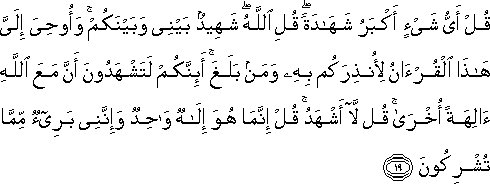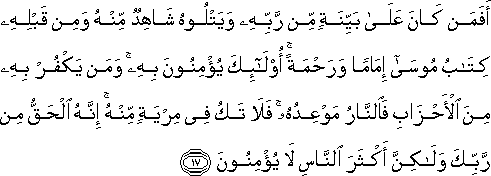If someone asks about the best methods of Tafsir, we reply that the best method is to explain the Qur'an with the Qur'an itself. What is mentioned in general terms in one place in the Qur'an, is usually explained in another place. When one does not find this easily, he should look to the Sunnah because its purpose is to explain the Qur'an and elaborate upon itsmeanings. Allah said,

‘Surely, We have sent down to you (O Muhammad SAW) [1] the Book (this Quran) in truth that you might judge between men by that which Allah has shown you, so be not a pleader for the treacherous.’ (An Nisa 4:105)

‘And We have also sent down unto you (O Muhammad SAW) the reminder and the advice (the Quran), that you may explain clearly to men what is sent down to them, and that they may give thought.’ (An Nahl 16:44) and,
‘This is why the Messenger of Allah said,
‘The Sunnah was a revelation from Allah just as the Qur'an, although it is not recited as the Qur'an is recited.’
So one seeks the Tafsir of the Qur'an with the Qur'an itself and with the Sunnah. If one cannot find the Tafsir in the Qur'anor Sunnah, he should refer to the statements of the Companions, who were the most knowledgeable of Tafsir, for they witnessed the situations and incidents that we did not witness. They also had the deepest comprehension, the most correct knowledge, and the most righteous works. Especially the scholars and leaders among them, such as the FourRightly Guided Khalifahs and righteous Imams, and `Abdullah bin Mas`ud, may Allah be pleased with them all. Imam Abu Ja'far bin Jarir At-Tabari narrated that 'Abdullah bin Mas`ud said,
"By He other than Whom there is no God, no Ayah in the Book of Allah was revealed but I have knowledge about whomand where it was revealed. Verily, if I know of a person who has more knowledge than me in the Book of Allah that the animals can reach (by travelling on them), I will travel to meet him."
Also, among the scholars of the Companions is the great scholar, the sea of knowledge, 'Abdullah bin `Abbas, the cousin of the Messenger of Allah, and the explainer of the Qur'an, as a result of the blessing of the supplication of the Messenger of Allah peace be upon him. The Prophet invoked Allah for the benefit of Ibn `Abbas,
(O Allah! Teach him Fiqh in the religion and interpretation.) [3]
Further, Ibn Jarir At-Tabari reported that `Abdullah bin Mas`ud said, "Yes, Ibn 'Abbas is the interpreter of the Qur'an." ThisHadith has an authentic chain of narrators. [4] Ibn Mas`ud died in the thirty-second years of Hijrah and 'Abdullah bin `Abbas lived for thirty-six years after that. Hence, what do you think about the knowledge that Ibn 'Abbas collected after Ibn Mas`ud? Al-A'mash said that Abu Wa'il said, "Ali once appointed 'Abdullah bin `Abbas to lead the Haj season. Ibn 'Abbas gave a speech to the people in which he read and explained Surat Al Baqarah (according to another narration,Surat An-Nur) in such a way, that if the Romans, Turks and the Daylam heard him, they would have embraced Islam." [5]
This is why the majority of the knowledge Ismail bin `Abdur Rahman As-Suddi Al-Kabir collected in his Tafsir is from thesetwo men, Ibn Mas`ud and Ibn `Abbas. Yet, he sometimes mentions what they narrated of the Israelite accounts that theMessenger of Allah has allowed when he said,
‘Convey on my behalf, even if it is one Ayah (sentence), and narrate from the Children of Israel, as there is no sin in this.And whoever intentionally lies on me, let him assume his assured seat in the Fire.’
This Hadith from 'Abdullah bin Amr was collected by Al- Bukhari (Fath Al-Bari 6:572). This is why when `Abdullah bin 'Amr had possession of two books from the People of the Scripture on the Day (battle) of the Yarmuk, he used to narrate what was in- them, because of what he understood of the Hadith that allowed this practice.
Israelite Accounts and Tales
Yet, the Israelite accounts and stories should only be used Not supporting evidence, not as evidence themselves. There are three types of these accounts and tales; a kind that we are `tire is authentic because we have in our religion something that testifies to its truth. The second type is what we know to be false based on what we have. The third is of neither type. Hence, we neither affirm nor deny this type, and we are allowed to narrate it, because of the Hadith that we mentioned. The majority of these are of no religious benefit. 'In instance, an Israelite tale mentions the names and number of the people of the Cave (Al-Kahj) and the color of their dog. They also include the type of tree Moses' staff was made of, the kind of the birds Ibrahim brought back to life by Allah's leave, the part of the cow the dead Israelite was struck with to resurrect him, and the kind of tree that Allah spoke to Moses through. Such examples of things that Allah kept unexplained in the Qur'an do not carry any daily or religious significance for responsible adults.
Tafsir of the Tabi`in
When unable to find the Tafsir in the Qur'an, the Sunnah or with the Companions, the scholars then look to the Tafsir ofthe Tabi`in, (second generation of Islam) such as Mujahid bin Jabr, who was a wonder himself in Tafsir. Muhammad binIshaq narrated that Abban bin Salih said that Mujahid said, "I reviewed the Mushaf with Ibn `Abbas thrice from beginning toend asking him about each and every Ayah in it." Also, Ibn Jarir narrated that Ibn Abi Mulaykah said, "I saw Mujahidasking Ibn `Abbas about the Tafsir of the Quran while he was holding his tablets (papers). Ibn 'Abbas would say to him,Write,' until Mujahid asked him about the entire Tafstr." This is why Sufyan Ath-Thawri said, "If the Tafsir reaches you fromMujahid, then it is sufficient for you." [5]
The scholars of Tafsir also include Sa`id bin Jubayr, 'Ikrimah-the freed servant of Ibn 'Abbas, 'Ata' bin Abi Rabah, Al-Hasan Al-Basri, Masruq bin Al-Ajda`, Sa'Id bin AlMusayyib, Abu Al-`Aliyah, Ar-Rabi` bin Anas, Qatadah, Ad Dahhak bin Muzahim and other scholars among the Tabi`in and the following generations.
The statements of these Imams should be mentioned and referred to for Tafsir. We should mention here that these scholars use a variety of meanings for some words, leading those who do not have enough knowledge to think that they conflict, and thus, they consider them opposing statements. This is not correct, for some of these scholars would use variations of the same expressions and some of them would use the precise terms.
These meanings are all the same in the majority of instances, and those who have sound comprehension see this, and Allah is the One Who guides and directs to success.
Tafsir by mere Opinion
It is prohibited to indulge in Tafsir by mere opinion. Muhammad bin Jarir reported that Ibn 'Abbas said that the ProphetPeace be upon him said,
(For this, and the previous quotes, see At-Tabari 1:90-91)
[Whoever explains the Qur'an with his opinion or with what he has no knowledge of, then let him assume his seat in the Fire.]
At-Tirmidhi, An-Nasa'i and Abu Dawud also recorded this Hadith. At-Tirmidhi said, "Hasan".
Explaining what One has Knowledge of, Silence otherwise
The Salaf used to refrain from explaining what they had no knowledge of. For instance, Ibn Jarir (At-Tabari) reported that Abu Ma'mar said that Abu Bakr As-Siddiq said, " Which land will carry me and which heaven will shade me if I said aboutAllah's Book that which I have no knowledge of? " [6]
Ibn Jarir also reported that Anas narrated that 'Umar bin Al-Khattab read the Ayah,~{And fruits and Abba (herbage, etc.)
while standing on the Minbar. He then said, " We know the fruit, so what is the Abba?" He then said, "O 'Umar! This is exaggeration." [7]
This statement means that 'Umar briefly wanted to know the exact nature of the Abba, for it was evident - to him - that it is a plant that grows on earth, just as Allah said,

‘And We cause therein the grain to grow. And grapes and clover plants’ (i.e. green fodder for the cattle) (80:27-28).
Ibn Jarir also recorded that Ibn Abi Mulaykah said that Ibn 'Abbas was asked about an Ayah, "That if any of you is asked about, he will indulge in its Tafsir." without hesitation Ibn 'Abbas refused to say anything about it (meaning with his opinion). This narration has an authentic chain of narrators. He also narrated that Ibn Abi Mulaykah said, "A man asked Ibn 'Abbas about, One Day, the space whereof is a thousand years.
Ibn 'Abbas asked him, What is, Day the measure whereof is fifty thousand years~?'
The man said, `I only asked you to tell me.' Ibn 'Abbas said, They are two Days that Allah has mentioned in His Book and He has better knowledge of them.' He disliked commenting on the Book of Allah when he had no knowledge about it."
Al-Layth narrated that Yahya bin Sa`id said that Said bin Al-Musayyib used to talk about what he knows of the Qur'an (At-Tabari 1:86). Also, Ayyub, Ibn 'Awn and Hisham AdDastuwa i narrated that Muhammad bin Sirin said, "I asked 'Ubaydah (meaning, As-Salmani ) about an Ayah of the Qur'an and he said,
"Those who had knowledge about the circumstances surrounding revelation of the Qur'an have perished. So fear Allah and seek the right way."
Ash-Sha`bi narrated that Masruq said, "Avoid Tafszr, because it is narration related to Allah." [8]
These authentic narrations from the Companions and the Imams of the Salaf (righteous ancestors) testify to theirhesitation to indulge in the Tafsir of what they have no knowledge of. As for those who speak about what they have linguistic and religious knowledge of, then there is no sin in this case. Hence, the scholars and the Imams, including the ones we mentioned, issued statements of Tafsir and spoke about what they had knowledge of, but avoided what they hadno knowledge of.
Refraining from indulging in what one has no knowledge of is required of everyone, just as everyone is required to convey the knowledge that they have when they are asked. Allah said,

‘To make it known and clear to mankind, and not to hide it’ (3:187);
Also, a Hadith narrated through several chains of narrators says, [9]
(Whoever is asked about knowledge that he knows but hid it, will be tied with a muzzle made of fire on the Day ofResurrection.)
References
[1] was given the Qur'an and its equal with it)), in reference to the Sunnah. 2
[2] Ahmad 4:131
[3] Fath Al-Bari 1:205.
[4] At-Tabari 1:90.
[5] At-Tabari 1:81.
[6] At-Tabari 1:78.
[7] At-Tabari 24:229.
[8] At Tabari 1:86, for these quotes.
[9] Ahmad, At-Tirmidhi, and others.
Read more...















